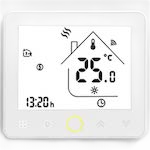Moes BHT-002
| Model | BHT-002 |
| Vendor | Moes |
| Description | Moes BHT series Thermostat |
| Exposes | child_lock, deadzone_temperature, max_temperature_limit, min_temperature_limit, climate (current_heating_setpoint, local_temperature, local_temperature_calibration, system_mode, running_state, preset), sensor, program |
| Picture |  |
Notes
Pairing
Switch the thermostat off. Press and hold the temperature down button for +- 8 seconds to enable the pairing mode (display lights up and a WiFi-like icon is blinking). After successful interview turn the thermostat on again.
Stop message flooding
This unit has a bug that makes it send multiple messages when updating. To stop this from flooding your MQTT Queues, please add the following to your configuration.yaml file:
devices:
'0x12345678':
friendly_name: thermostat
debounce: 1
Exposes
Child lock (binary)
Enables/disables physical input on the device. Value can be found in the published state on the child_lock property. It's not possible to read (/get) this value. To write (/set) a value publish a message to topic zigbee2mqtt/FRIENDLY_NAME/set with payload {"child_lock": NEW_VALUE}. If value equals LOCK child lock is ON, if UNLOCK OFF.
Deadzone temperature (numeric)
The delta between local_temperature and current_heating_setpoint to trigger Heat. Value can be found in the published state on the deadzone_temperature property. It's not possible to read (/get) this value. To write (/set) a value publish a message to topic zigbee2mqtt/FRIENDLY_NAME/set with payload {"deadzone_temperature": NEW_VALUE}. The minimal value is 0 and the maximum value is 5. The unit of this value is °C.
Max temperature limit (numeric)
Maximum temperature limit. Cuts the thermostat out regardless of air temperature if the external floor sensor exceeds this temperature. Only used by the thermostat when in AL sensor mode.. Value can be found in the published state on the max_temperature_limit property. It's not possible to read (/get) this value. To write (/set) a value publish a message to topic zigbee2mqtt/FRIENDLY_NAME/set with payload {"max_temperature_limit": NEW_VALUE}. The minimal value is 0 and the maximum value is 80. The unit of this value is °C.
Min temperature limit (numeric)
Minimum temperature limit for frost protection. Turns the thermostat on regardless of setpoint if the temperature drops below this.. Value can be found in the published state on the min_temperature_limit property. It's not possible to read (/get) this value. To write (/set) a value publish a message to topic zigbee2mqtt/FRIENDLY_NAME/set with payload {"min_temperature_limit": NEW_VALUE}. The minimal value is 1 and the maximum value is 5. The unit of this value is °C.
Climate
This climate device supports the following features: current_heating_setpoint, local_temperature, local_temperature_calibration, system_mode, running_state, preset.
current_heating_setpoint: Temperature setpoint. To control publish a message to topiczigbee2mqtt/FRIENDLY_NAME/setwith payload{"current_heating_setpoint": VALUE}whereVALUEis the °C between5and45. Reading (/get) this attribute is not possible.local_temperature: Current temperature measured on the device (in °C). Reading (/get) this attribute is not possible.system_mode: Mode of this device. To control publish a message to topiczigbee2mqtt/FRIENDLY_NAME/setwith payload{"system_mode": VALUE}whereVALUEis one of:off,heat. Reading (/get) this attribute is not possible.preset: Mode of this device (similar to system_mode). To control publish a message to topiczigbee2mqtt/FRIENDLY_NAME/setwith payload{"preset": VALUE}whereVALUEis one of:hold,program. Reading (/get) this attribute is not possible.running_state: The current running state. Possible values are:idle,heat,cool. Reading (/get) this attribute is not possible.local_temperature_calibration: Offset to add/subtract to the local temperature. To control publish a message to topiczigbee2mqtt/FRIENDLY_NAME/setwith payload{"local_temperature_calibration": VALUE}.The minimal value is-30and the maximum value is30with a step size of0.1.
Sensor (enum)
Select temperature sensor to use. Value can be found in the published state on the sensor property. It's not possible to read (/get) this value. To write (/set) a value publish a message to topic zigbee2mqtt/FRIENDLY_NAME/set with payload {"sensor": NEW_VALUE}. The possible values are: IN, AL, OU.
Program (composite)
Time of day and setpoint to use when in program mode. Can be set by publishing to zigbee2mqtt/FRIENDLY_NAME/set with payload {"program": {"weekdays_p1_hour": VALUE, "weekdays_p1_minute": VALUE, "weekdays_p1_temperature": VALUE, "weekdays_p2_hour": VALUE, "weekdays_p2_minute": VALUE, "weekdays_p2_temperature": VALUE, "weekdays_p3_hour": VALUE, "weekdays_p3_minute": VALUE, "weekdays_p3_temperature": VALUE, "weekdays_p4_hour": VALUE, "weekdays_p4_minute": VALUE, "weekdays_p4_temperature": VALUE, "saturday_p1_hour": VALUE, "saturday_p1_minute": VALUE, "saturday_p1_temperature": VALUE, "saturday_p2_hour": VALUE, "saturday_p2_minute": VALUE, "saturday_p2_temperature": VALUE, "saturday_p3_hour": VALUE, "saturday_p3_minute": VALUE, "saturday_p3_temperature": VALUE, "saturday_p4_hour": VALUE, "saturday_p4_minute": VALUE, "saturday_p4_temperature": VALUE, "sunday_p1_hour": VALUE, "sunday_p1_minute": VALUE, "sunday_p1_temperature": VALUE, "sunday_p2_hour": VALUE, "sunday_p2_minute": VALUE, "sunday_p2_temperature": VALUE, "sunday_p3_hour": VALUE, "sunday_p3_minute": VALUE, "sunday_p3_temperature": VALUE, "sunday_p4_hour": VALUE, "sunday_p4_minute": VALUE, "sunday_p4_temperature": VALUE}}
weekdays_p1_hour(numeric) max value is 23, unit is hweekdays_p1_minute(numeric) max value is 59, unit is mweekdays_p1_temperature(numeric) min value is 5, max value is 35, unit is °Cweekdays_p2_hour(numeric) max value is 23, unit is hweekdays_p2_minute(numeric) max value is 59, unit is mweekdays_p2_temperature(numeric) min value is 5, max value is 35, unit is °Cweekdays_p3_hour(numeric) max value is 23, unit is hweekdays_p3_minute(numeric) max value is 59, unit is mweekdays_p3_temperature(numeric) min value is 5, max value is 35, unit is °Cweekdays_p4_hour(numeric) max value is 23, unit is hweekdays_p4_minute(numeric) max value is 59, unit is mweekdays_p4_temperature(numeric) min value is 5, max value is 35, unit is °Csaturday_p1_hour(numeric) max value is 23, unit is hsaturday_p1_minute(numeric) max value is 59, unit is msaturday_p1_temperature(numeric) min value is 5, max value is 35, unit is °Csaturday_p2_hour(numeric) max value is 23, unit is hsaturday_p2_minute(numeric) max value is 59, unit is msaturday_p2_temperature(numeric) min value is 5, max value is 35, unit is °Csaturday_p3_hour(numeric) max value is 23, unit is hsaturday_p3_minute(numeric) max value is 59, unit is msaturday_p3_temperature(numeric) min value is 5, max value is 35, unit is °Csaturday_p4_hour(numeric) max value is 23, unit is hsaturday_p4_minute(numeric) max value is 59, unit is msaturday_p4_temperature(numeric) min value is 5, max value is 35, unit is °Csunday_p1_hour(numeric) max value is 23, unit is hsunday_p1_minute(numeric) max value is 59, unit is msunday_p1_temperature(numeric) min value is 5, max value is 35, unit is °Csunday_p2_hour(numeric) max value is 23, unit is hsunday_p2_minute(numeric) max value is 59, unit is msunday_p2_temperature(numeric) min value is 5, max value is 35, unit is °Csunday_p3_hour(numeric) max value is 23, unit is hsunday_p3_minute(numeric) max value is 59, unit is msunday_p3_temperature(numeric) min value is 5, max value is 35, unit is °Csunday_p4_hour(numeric) max value is 23, unit is hsunday_p4_minute(numeric) max value is 59, unit is msunday_p4_temperature(numeric) min value is 5, max value is 35, unit is °C
